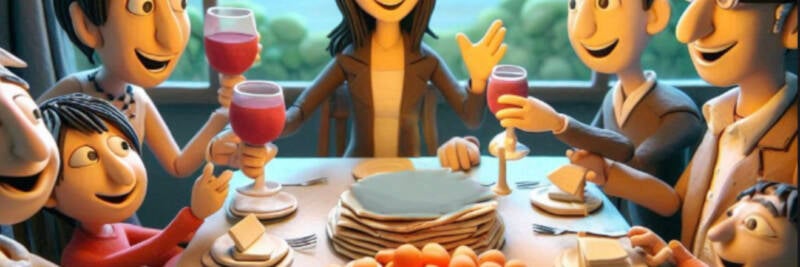Teach your children well the power of Passover

Published in The Times, 2nd May 2008
Share
Passover has come and gone and within the Jewish community we’re counting the days to Shavuot, Pentecost. But I want to stay with Passover and its key ritual – telling the story of the Exodus – because each year the conviction grows on me that it contains a series of truths we’re in danger of forgetting.
The first and most obvious fact is that it’s celebrated at home, within the extended family. Jewish families make immense efforts to be together for the festival, even if that means travelling long distances. In Judaism the home is holy, no less so than the synagogue. It’s where, every Friday night, Jewish husbands sing a song of praise to their wives, and parents bless their children. It’s where at Passover we hand on our story to the next generation. Some civilisations survived because of their armies, others because of their economies. Judaism survives because of its families.
No less striking is that the entire Passover ritual is child-centred. It begins with questions asked by the youngest child. It continues through a set of answers directed to the child. It ends with boisterous songs introduced to sustain the interest of a child. The children at the table know that they are the most important people there.
Some years ago I read a book, written by an Israeli, about the relationships between Jews, Muslims and Christians in the Holy Land. It contained a fascinating remark made by a nun, Sister Maria Teresa: “I watch the [Jewish] families who visit here on weekends; how the parents behave toward their children, speaking to them with patience and encouraging them to ask intelligent questions. It’s an example for the whole world. The strength of this people is the love of parents for their children.” I see a very similar devotion to children among the Sikhs I’ve been privileged to know.
Sister Maria’s remark touches on another feature of Judaism: the idea that Jewish parents must teach their children to ask questions. We do not believe that faith is blind or unquestioning. Nor do we believe that education is a process in which adults speak and children listen, adults command and children obey. That is the sign of an authoritarian culture, not a free society.
In the Hebrew Bible, people ask questions of God, and the greater the person, the deeper the question. That’s what Abraham, Moses, Jeremiah and Job – our heroes – did. Open hearts go together with open minds. In Judaism religious faith is like the faith of a scientist who never gives up asking questions until he finds an answer. There are some questions, such as “Why do the innocent suffer?”, to which we will never find an answer this side of Heaven. But we keep asking – and because we keep asking, we do what we can to minimise the suffering of the innocent. We do not accept the poverty and pain, the injustice and violence of this world as God’s will.
Perhaps the most important thing at Passover is that we never allow ourselves to forget where we came from. We, in Britain today, enjoy so much of what our ancestors never knew: affluence, freedom, civic equality, tolerance. The danger is that we come to take these things for granted – and that is how we risk losing them.
Because of Passover we never forget the taste of matzah and maror, the unleavened bread of affliction, and the bitter herbs of slavery. We learn that they too are part of our story. Because of it we do what we can to alleviate the poverty and suffering of others. That is part of the text and texture of Jewish life. But it also helps our children not to become spoilt, blasé; and if they ever do, it means we haven’t taken the Passover story seriously enough.
In a book I wrote recently about British society, I argued that if we are to integrate our unprecedented ethnic diversity into a nation with a strong sense of shared identity and commitment to the common good, we need a national story and a context in which to tell it. Some were sceptical. Can a story sustain a society? Look at Passover – a story told by a hundred generations of Jewish parents to their children – and you will know that it can, it does, and there is no other way.
